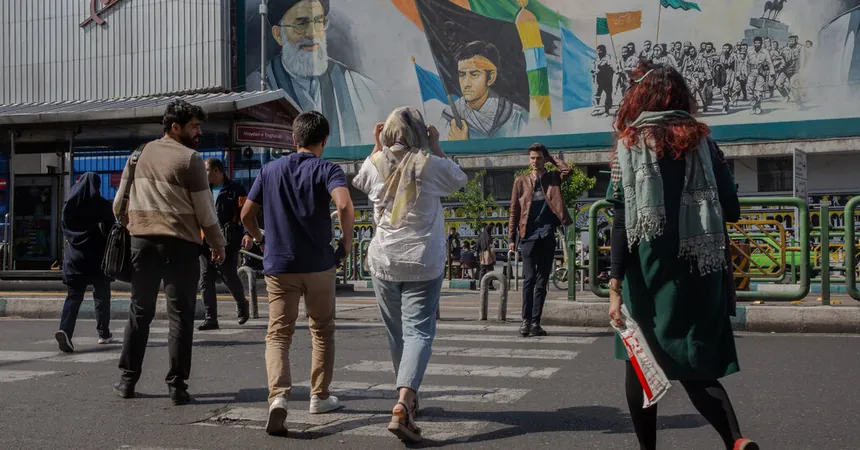
The High Stakes of the Iran-U.S. Nuclear Talks: Can Peace Prevail?
2025-04-26
Author: Ken Lee
The Latest on Iran-U.S. Negotiations
A pivotal third round of negotiations between Iran and the United States kicked off this Saturday, igniting hopes for a groundbreaking deal that could steer the Middle East away from potential conflict.
In a bold statement, President Trump declared, "I think we’re going to make a deal with Iran. Nobody else could do that," referencing his controversial decision to ditch the prior nuclear agreement in 2018, which he labeled as profoundly flawed.
A Turning Point for Regional Stability
These talks bear the power to redefine both regional and global security dynamics, reducing the likelihood of an attack on Iranian nuclear facilities by a U.S.-backed Israel and staving off Iranian nuclear armament. A successful agreement could also drastically reshape Iran's economy and politics by rolling back U.S. sanctions and inviting foreign investments.
Who’s at the Negotiation Table?
During the discussions hosted by Oman, key figures such as Trump's Middle East envoy Steve Witkoff and Iranian Foreign Minister Abbas Araghchi were in attendance, along with specialized technical teams. The focus this round involves detailed "expert talks" aimed at addressing critical topics like nuclear facility monitoring, uranium enrichment levels, and stockpiling highly enriched uranium.
The Stakes Involved
A fresh nuclear accord could either delay or prevent a wider conflict with Israel and the U.S. The recent Gaza conflict has escalated tensions, with the New York Times revealing Israel’s intentions to target Iranian nuclear sites as early as next month—a plan that Trump reportedly halted for negotiation purposes.
Trump notably remarked, "I didn’t make it comfortable for them [Israel], because I think we can make a deal without the attack. But it’s possible we’ll have to attack because Iran will not have a nuclear weapon." This statement underscores the precarious line on which these negotiations walk.
Iran's Nuclear Aspirations
Iran has enriched uranium to nearly 60% purity— dangerously close to weapons-grade levels. The U.N.’s International Atomic Energy Agency warns that Iran possesses enough material to construct several nuclear bombs if it chooses to weaponize. While Iran insists its nuclear ambitions are peaceful, the IAEA has not presented evidence of weaponization.
Economic Ramifications for Iran
Beyond geopolitical implications, the outcome of these negotiations is vitally important for the Iranian economy and its 90 million citizens. Years of sanctions have precipitated rampant inflation and widespread economic despair, leaving many Iranians hungry for relief and a way out of their economic plight.
What’s Next for Negotiations?
The first and second rounds of discussions laid the groundwork, with both sides expressing optimism regarding the trajectory of negotiations. Iranian representatives have indicated a willingness to revert to enrichment levels in line with the 2015 agreement, suggesting a commitment to collaboration.
Key Issues at Play
However, significant sticking points remain—most notably, whether Iran should be allowed to continue enriching uranium. Trump’s advisers are split on this issue, which could incite backlash against the administration for merely reviving elements of the former Obama-era agreement.
Potential strategies for improving upon the old deal include more stringent oversight of Iran's nuclear activities, collaborative ventures for maintaining nuclear sites, and ensuring that Iran’s assurances are unwavering and long-term.
A Distrustful Legacy
Arriving at this juncture, both parties grapple with profound distrust rooted in the history of the Joint Comprehensive Plan of Action—an agreement designed to halt Iran’s nuclear arsenation by capping uranium enrichment and allowing for rigorous inspections. The stakes have never been higher—can these negotiations lead to a genuine peace, or are we once again teetering on the brink of war?


 Brasil (PT)
Brasil (PT)
 Canada (EN)
Canada (EN)
 Chile (ES)
Chile (ES)
 Česko (CS)
Česko (CS)
 대한민국 (KO)
대한민국 (KO)
 España (ES)
España (ES)
 France (FR)
France (FR)
 Hong Kong (EN)
Hong Kong (EN)
 Italia (IT)
Italia (IT)
 日本 (JA)
日本 (JA)
 Magyarország (HU)
Magyarország (HU)
 Norge (NO)
Norge (NO)
 Polska (PL)
Polska (PL)
 Schweiz (DE)
Schweiz (DE)
 Singapore (EN)
Singapore (EN)
 Sverige (SV)
Sverige (SV)
 Suomi (FI)
Suomi (FI)
 Türkiye (TR)
Türkiye (TR)
 الإمارات العربية المتحدة (AR)
الإمارات العربية المتحدة (AR)